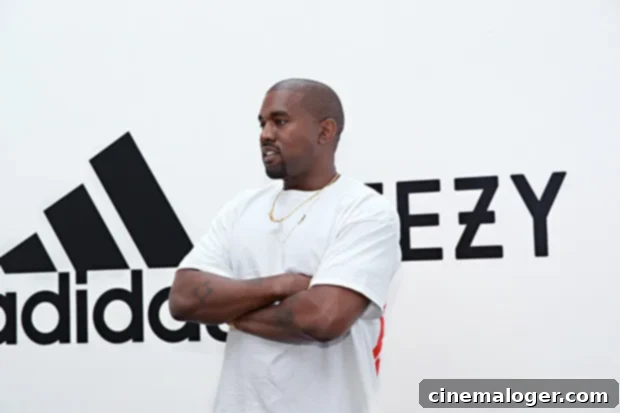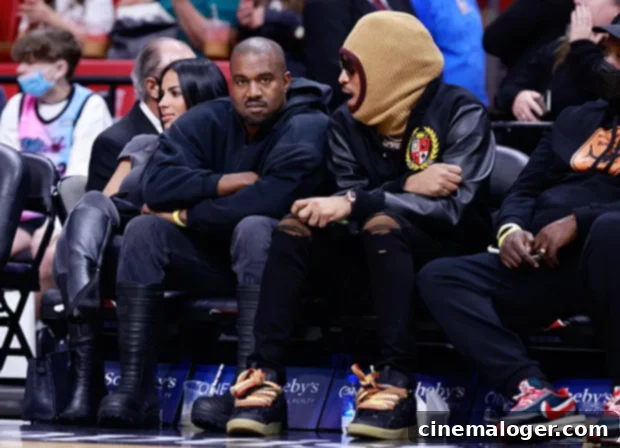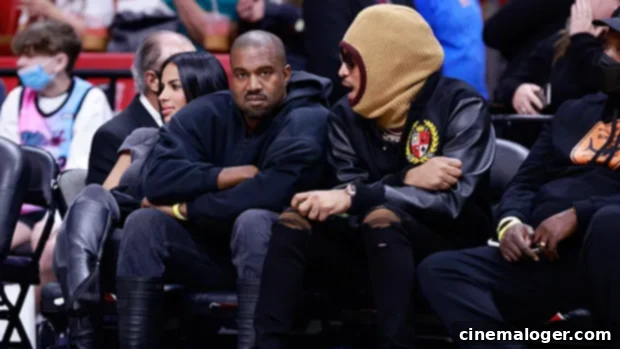Kanye West Stripped of Billionaire Status: The Fallout from Antisemitic Remarks and Adidas Breakup
In a dramatic turn of events that saw global brands severing ties with the controversial artist, Kanye “Ye” West, once hailed as a fashion and music icon, has officially been stripped of his coveted billionaire status. This monumental financial downfall directly follows a series of unhinged antisemitic comments made by Ye, which rapidly alienated long-standing business partners and sparked widespread condemnation. The most significant blow came from Adidas, a titan in the sportswear industry, whose nine-year partnership with Ye was the cornerstone of his vast fortune.
The rapper’s provocative remarks, including a now-infamous assertion on the Drink Champs podcast, “I can say antisemitic sh-t, and Adidas cannot drop me,” proved to be a severe miscalculation. In what many observers described as a textbook definition of “FAFO” (F*** Around and Find Out), Adidasdiddrop Ye. This decisive action, following intense public pressure and a wave of outrage over his antisemitic comments, marked the abrupt end of a highly lucrative collaboration that had propelled West into the exclusive club of billionaires. The immediate aftermath saw Forbes confirming that “the superstar rapper no longer has a place on the Forbes billionaires’ list now that his lucrative deal with Adidas is over.” The termination of the Yeezy partnership didn’t just end a business relationship; it fundamentally reshaped Kanye West’s financial landscape and public image.
Listen to Kanye here: “the thing about it being Adidas I can say antisemitic things and Adidas can’t drop me … now what … now what …” @adidas pic.twitter.com/Qu5LcZnmJj
— StopAntisemitism (@StopAntisemitism) October 20, 2022
The Colossal Financial Impact: Losing Yeezy’s Billions
The partnership between Ye and Adidas, primarily centered around his highly sought-after line of Yeezy sneakers and apparel, was not merely a collaboration; it was a financial powerhouse. According to Forbes, this venture alone accounted for an astonishing “$1.5 billion of his net worth.” This valuation was derived from a sophisticated calculation, multiplying annual earnings and viewing Ye’s royalties from Adidas as comparable to the stable, long-term income generated from music catalogs or film residuals. The consistent demand for Yeezy products, combined with Ye’s creative direction, had created a reliable revenue stream that was, until his controversial statements, perceived as a near-permanent fixture of his wealth.
The termination of this cornerstone deal immediately slashed Ye’s estimated net worth to approximately $400 million. While $400 million remains a substantial sum that certainly isn’t to be “discounted,” it unequivocally pulls him out of the exclusive billionaire club. This dramatic revaluation highlights the critical role that brand partnerships, especially those of the scale and success of Yeezy, play in the financial portfolios of modern celebrities. Without the consistent, high-value royalties and the asset value of the Adidas deal, West’s remaining fortune is composed of diversified, yet less potent, assets.
The remainder of West’s fortune is now primarily distributed across “real estate, cash, his music catalog, and a 5% stake in ex-wife Kim Kardashian‘s shapewear firm, SKIMS.” However, it’s important to note that Forbes also reports that Ye has not been actively involved in SKIMS since 2019, suggesting this stake’s value might be more passive than active. These assets, while collectively significant, do not possess the rapid growth potential or the sheer magnitude of the Yeezy empire, making a swift return to billionaire status a distant prospect without new, equally massive ventures.

A Cascade of Consequences: Other Brands Follow Suit
Adidas was hardly the first, but undoubtedly the most impactful, in a growing list of entities to sever ties with Ye following his inflammatory comments. This widespread corporate disavowal underscores a broader shift in how companies address controversial celebrity endorsements, prioritizing ethical stands over potential profits.
Months prior, in September, Gap had already terminated its Yeezy Gap partnership with Ye, though initially due to a public feud over creative control and contract disputes. However, following Adidas’s more definitive moral stance, Gap issued a powerful statement unequivocally condemning West’s antisemitic remarks. The company declared, “In September, Gap announced ending its Yeezy Gap partnership, our former partner’s recent remarks and behavior further underscore why. We are taking immediate steps to remove Yeezy Gap products from our stores, and we have shut down yeezygap.com. Antisemitism, racism, and hate in any form are inexcusable and not tolerated in accordance with our values.” This move demonstrated a clear commitment to corporate social responsibility, even if it meant a significant financial unwind.
The repercussions extended across various industries. Earlier in October, financial giant JP Morgan reportedly decided it would no longer continue its banking relationship with West, effectively cutting off a vital financial lifeline. In the high-stakes world of fashion, Balenciaga, a luxury brand with whom Ye had a prominent working relationship—even walking down their runway during Paris Fashion Week just weeks prior—swiftly called off all collaborations. The influential fashion publication Vogue also publicly announced its definitive stance, stating it had “no intention” of ever working with Ye again, signalling a major ostracization from the fashion elite.
The entertainment industry also reacted strongly. MRC, a prominent film and television studio, announced it was canning a completed documentary about Ye, deciding the content was no longer suitable for release given his behavior. His talent agency, CAA (Creative Artists Agency), one of the most powerful in Hollywood, also dropped him, a move that significantly cripples a celebrity’s ability to secure new projects and endorsements. Even legal representation became problematic: Camille Vasquez, the high-profile lawyer renowned for her work with Johnny Depp in his defamation case against ex-wife Amber Heard, reportedly dropped Ye after his firm had been hired to represent his business interests. The widespread nature of these severances paints a stark picture of an artist rapidly losing his professional support system across the board.

Ye’s Defiance and Nuanced Apology
Amidst the growing storm of criticism and corporate exits, Kanye West remained largely defiant. During an interview with Piers Morgan, Ye was directly asked if he was “sorry” for his incendiary tweets about going “death con 3” on the Jewish community and other offensive statements. His initial response was blunt: “No. Absolutely not.” This uncompromising stance further solidified public perception of his unapologetic posture and drew even more ire.
However, as the interview progressed, a slight shift in tone became apparent. Ye eventually offered a more nuanced and conditional apology, stating, “You know, I will say I’m sorry for the people that I hurt with the defcon, the confusion that I caused. I feel like I caused hurt and confusion. And I’m sorry for the families of the people that had nothing to do with the trauma that I had been through and that I use my platform where you say, ‘hurt people hurt people,’ and I was hurt.” This statement, while acknowledging the pain he inflicted, also framed his actions through the lens of his own past “trauma” and personal hurt, echoing the common psychological adage. While it offered a glimmer of remorse, many critics found it insufficient, viewing it as a deflection rather than a full, unconditional acceptance of responsibility for the antisemitic nature of his comments.
The Broader Implications for Celebrity and Accountability
Kanye West’s dramatic fall from grace serves as a stark reminder of the increasing scrutiny placed on public figures, especially in the age of social media. The speed and severity with which brands reacted to his antisemitic remarks highlight a growing corporate commitment to ethical standards and social responsibility. No longer are companies willing to overlook hateful rhetoric, even from their most profitable partners, demonstrating a shift where financial success cannot always outweigh moral principle.
This episode also fuels ongoing debates about “cancel culture” versus accountability. While some argue that Ye’s career and wealth were “canceled,” others contend that he faced appropriate consequences for hate speech, emphasizing that freedom of speech does not equate to freedom from consequences. The widespread condemnation from diverse sectors, including fashion, finance, and entertainment, suggests a collective rejection of antisemitism and other forms of bigotry, signaling a potential new precedent for how celebrity behavior is handled in the public sphere.
The long-term impact on Kanye West’s legacy is yet to be fully seen. While his musical catalog remains a powerful asset, his ability to forge new, major brand partnerships or regain the trust of the corporate world appears severely compromised. His journey from cultural trailblazer to financially diminished pariah underscores the delicate balance between artistic expression, personal opinion, and the profound responsibility that comes with immense influence and public platforms. The saga of Ye’s lost billionaire status will undoubtedly be studied as a pivotal case in the annals of celebrity endorsements and corporate ethics.
